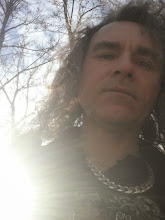
Please, don't get me wrong; it's not at all that I think Rauschenberg was an insignificant figure in the least. It's rather that everything I have seen (in books and in person) and read (from genuinely critical sources) leads me to believe that Rauschenberg's actual project was not to contribute to but rather to destroy high culture, and in particular the institution of the Museum. His aim was always to replace reverence with loud laughter. Rauschenberg, like his associate the maverick musician John Cage, is almost always pictured smiling broadly and laughing heartily. But are these expression indicative of good-natured joy and human warmth? Or do they rather evince hostility and mockery, or perhaps simply an unashamed and unapologetic acknowledgment of the absurdity of most all we've been taught to respect?
Famed art historian Peter Berger summed up the issue in these terms:
In the begining was a smile, an irritating smile. . . . In vain, I seek a similarly apropos phrase to define the smile in question here that always appears on the lips of the advocates of poststructuralism when one intends to propose an argument. So arrives the thought that to understand poststructuralism means nothing other than to understand this smile.Religious piety aside, are these artist laughing with, or are they laughing at Humanity? I propose this to you, as I have to all my classes in the past, as a serious question.

In any case, well-meaning idiots, like PBS, apparently never stop to ask themselves this question. Most likely because more often than not there's no immediate reward for being critical. And because they are two deeply mired in the self-congratulatory "Intellectual Traditions" ideology of which I have tried to remain skeptical throughout the semester - and in all my classes, not just this one.
This process of recension is one I want you to consider as we watch how the Christian Fathers gradually assembled a set of canonical books and orthodox teachings which, over time, functioned effectively to turn Jesus from a radical trouble-maker (of one sort or another) into a full-fledged conservative, something which by any responsible scholarly account he simply wasn't. And this, of course, is what the Museum mentality does to all lives and works of art and literature. Because these texts made an impact in their day, and because we feel a need to explain how our own current thoughts and practices derive from these pure sources, or simply because we like to congratulate ourselves for being cultured; we "interpolate" significant (and therefore potentially dangerous and unsettling) events from the past, until they become "Great Men", "Great Ideas" and "Great Books". Quite bluntly, I don't buy it. This mentality, no matter what you're been told and no matter how obvious and natural may seem, is the effect of an ideological system of which I am a renegade product. I will freely admit that I gained familiarity with intriguing texts through this sort of intellectual baby-sitting (precisely what Kant attacks as 'infantile' in "What is Enlightenment?"). But at a certain moment in my life I found it imperative to break away from what other people (some of them my institutional superiors) told me think. It became necessary to stand back from my education and ask myself, not how it ultimately made me "a better person" (zzzzzzzzz!), but rather what had it turned me into in the first place?

Some of you will wonder why I ask you to read not just great books but also minor ones. Some of you will wonder why we move so slowly. Some of you will wonder why I ask such pointless questions, or don't seem to present clear and definitive answers. Some of you will question what the whole point of the whole class is. Some of you, at the end of the semester, will write poor evaluations of the course; for a host of reasons, a quite frequently because it didn't look organized and professional along the lines of what you get in your science classes. But I would ask you to consider this: What does scientific research really look like? Does scientific research begin by assuming everything you feel to conform to common sense is actually the case? Or does not science actually begin by interrogating common-sense assumptions. Any scientific research proceeds according to method. The scientist works like an archaeologist; or a crime-scene investigator, who must not jump to conclusions or take anything from granted. Critical and methodical researchers must uncover not just what looks immediately interesting, but rather they must map out an entire site. Showing how two objects which look like they belong together were actually deposited thousands of years apart. Such researchers must get behind all the assumptions that have been handed us, until we see that reality (or at least the rational explanation of it) in fact works far differently from what common sense first tells us.
If you can begin to adopt this attitude with regard to our readings, you will have a enlightening and enjoyable experience in this course. If you simply want me to tell you what the "great writers" had to say so that you can say that you have studied "Intellectual Traditions" and therefore deserve to be awarded special "Honors" which distinguish you from the average student, then this class, though not necessarily intentionally so, is pretty much designed to make you utterly miserable. Oops! Whereas, if you want to begin to explore not just what we have been told to believe, but also how and why we have been told to believe at all, as well as what other alternatives to orthodox belief and behavior have arisen and are currently out there; then this class should be a fun and exciting adventure for you. At least that's my intention.

Robert Rauschenberg
Monogram. 1955-1959.
Moderna Museet
Stockholm, Sweeden


No comments:
Post a Comment